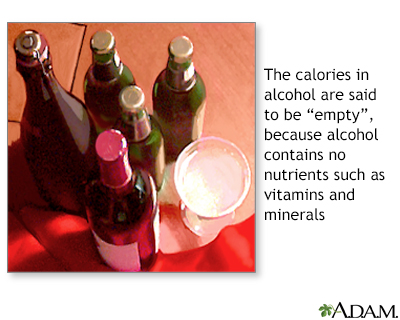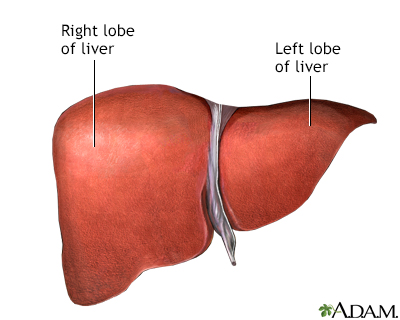Pregnancy SmartSiteTM
Alcohol dependence; Alcohol abuse; Problem drinking; Drinking problem; Alcohol addiction; Alcoholism - alcohol use; Substance use - alcohol DefinitionAlcohol use disorder is when your drinking causes serious problems in your life, yet you keep drinking. You may also need more and more alcohol to feel drunk. Stopping suddenly may cause withdrawal symptoms such as tremor, irritability and trouble sleeping. CausesNo one knows what causes problems with alcohol. Health experts think that it may be a combination of a person's:
Long-term risks of drinking an excessive amount of alcohol are more likely if:
One drink is defined as 12 ounces (oz) or 360 milliliters (mL) of beer (5% alcohol content), 5 oz or 150 mL of wine (12% alcohol content), or a 1.5-oz or 45-mL shot of liquor (80 proof, or 40% alcohol content). If you have a parent with alcohol use disorder, you are more at risk for alcohol problems. You also may be more likely to have problems with alcohol if you:
If you are concerned about your drinking, it may help to take a careful look at your alcohol use. SymptomsHealth care providers have developed a list of symptoms that a person has to have in the past year to be diagnosed with alcohol use disorder. Symptoms may include:
Exams and TestsYour provider will:
Your provider may order tests to check for health problems that are common in people who use alcohol. These tests may include:
TreatmentMany people with an alcohol problem need to completely stop using alcohol. This is called abstinence. Having strong social and family support can help make it easier to quit drinking. Some people are able to just cut back on their drinking. So even if you do not totally give up alcohol, you may be able to drink less. This can improve your health and relationships with others. It can also help you perform better at work or school. However, many people who drink too much find they can't just cut back. Abstinence may be the only way to manage a drinking problem. DECIDING TO QUIT Like many people with an alcohol problem, you may not recognize that your drinking has gotten out of your control. An important first step is to be aware of how much you drink. It also helps to understand the health risks of alcohol. If you decide to quit drinking, talk with your provider. Treatment involves helping you realize how much your alcohol use is harming your life and the lives of those around you. Depending on how much and how long you have been drinking, you may be at risk for alcohol withdrawal. Withdrawal can be very uncomfortable and even life threatening. If you have been drinking a lot, you should cut back or stop drinking only under the care of a provider. Talk with your provider about how to stop using alcohol. LONG-TERM SUPPORT Alcohol recovery or support programs can help you stop drinking completely. These programs usually offer:
For the best chance of success, you should live with people who support your efforts to avoid alcohol. Some programs offer housing options for people with alcohol problems. Depending on your needs and the programs that are available:
You may be prescribed medicines along with counseling and behavioral therapy to help you quit. This is called medication-assisted treatment (MAT). While MAT doesn't work for everyone, it is another option in treating the disorder. These medicines are often used for MAT.
It's a common misconception that taking medicine to treat alcohol use disorder is trading one addiction for another. These medicines are not addictive. They can help some people manage the disorder, just as people with diabetes or heart disease take medicine to treat their condition. Drinking may mask depression or other mood or anxiety disorders. If you have a mood disorder, it may become more noticeable when you stop drinking. Your provider will treat any mental disorders in addition to your alcohol treatment. Drinking significantly may also cause depression and anxiety. You need to stop drinking for at least a month to see if these symptoms get better and do not need further treatment. Support GroupsSupport groups help many people who are dealing with alcohol use. Talk to your provider about a support group that might be right for you. Outlook (Prognosis)How well a person does depends on whether they can successfully cut back or stop drinking. It may take several tries to stop drinking for good. If you are struggling to quit, do not give up hope. Getting treatment, if needed, along with support and encouragement from support groups and those around you can help you remain sober. Possible ComplicationsAlcohol use disorder can increase your risk of many health problems, including:
Alcohol use also increases your risk for violence. Drinking alcohol while you are pregnant can lead to severe birth defects in your baby. This is called fetal alcohol syndrome. Drinking alcohol while you are breastfeeding can also cause problems for your baby. When to Contact a Medical ProfessionalTalk with your provider if you or someone you know may have an alcohol problem. Seek immediate medical care or call 911 or the local emergency number if you or someone you know has an alcohol problem and develops severe confusion, seizures, or bleeding. If you or someone you know is thinking about suicide, call or text 988 or chat 988lifeline.org. You can also call 1-800-273-8255 (1-800-273-TALK). The 988 Suicide and Crisis Lifeline provides free and confidential support 24/7, anytime day or night. PreventionThe National Institute on Alcohol Abuse and Alcoholism recommends:
However, many experts believe that no amount of alcohol consumption is safe. ReferencesAmerican Psychiatric Association website. Anxiety disorders. Substance-related and addictive disorders. Diagnostic and Statistical Manual of Mental Disorders, Fifth Edition, Text Revision (DSM-5-TR). Washington, DC: American Psychiatric Association Publishing; 2022. Breuner C. Substance use disorders. In: Kliegman RM, St. Geme JW, Blum NJ, et al, eds. Nelson Textbook of Pediatrics. 22nd ed. Philadelphia, PA: Elsevier; 2025:chap 157. Nisavic M. Substance use disorders. In: Stern TA, Wilens TE, Fava M, eds. Massachusetts General Hospital Comprehensive Clinical Psychiatry. 3rd ed. Philadelphia, PA: Elsevier; 2025:chap 26. O'Connor PG. Alcohol use disorders. In: Goldman L, Cooney KA, eds. Goldman- Cecil Medicine. 27th ed. Philadelphia, PA: Elsevier; 2024:chap 364. US Preventive Services Task Force, Curry SJ, Krist AH, et al. Screening and behavioral counseling interventions to reduce unhealthy alcohol use in adolescents and adults: US Preventive Services Task Force recommendation statement. JAMA. 2018;320(18):1899-1909. PMID: 30422199 pubmed.ncbi.nlm.nih.gov/30422199/. | ||
| ||
Review Date: 4/19/2025 Reviewed By: Fred K. Berger, MD, DLFAPA, board-certified in psychiatry, Scripps Memorial Hospital, La Jolla, CA. Also reviewed by David C. Dugdale, MD, Medical Director, Brenda Conaway, Editorial Director, and the A.D.A.M. Editorial team. View References The information provided herein should not be used during any medical emergency or for the diagnosis or treatment of any medical condition. A licensed medical professional should be consulted for diagnosis and treatment of any and all medical conditions. Links to other sites are provided for information only -- they do not constitute endorsements of those other sites. No warranty of any kind, either expressed or implied, is made as to the accuracy, reliability, timeliness, or correctness of any translations made by a third-party service of the information provided herein into any other language. © 1997- A.D.A.M., a business unit of Ebix, Inc. Any duplication or distribution of the information contained herein is strictly prohibited. | ||


 Liver cirrhosis - ...
Liver cirrhosis - ... Fatty liver - CT s...
Fatty liver - CT s... Liver with disprop...
Liver with disprop... Alcoholism
Alcoholism Alcohol use disord...
Alcohol use disord... Alcohol and diet
Alcohol and diet Liver anatomy
Liver anatomy
